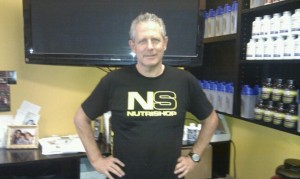Staying Healthy in the Second Half
When my doctor gave me two homework assignments in 2011, I had no idea how profoundly they would change my life:
1: Is it going to get easier or harder to lose weight as you grow older? and
2: Look around and see how many old, fat people you lose this week. Ask them how old they are.
When I went back to see him a week later, I said “OK – I’m in. What do I need to do.”
And so it began …
The story of the weight loss program is told elsewhere, but here I want to give you the seven and a half tips to survive past forty.

Seven and a Half Tips To Surviving The “Back Nine”
1: Goals
A goal must be measurable, attainable and have a target date. A goal without a date is just a dream.
Measuring progress in health is a tricky business. Many people measure pounds, pounds lost, pound need to lose, etc. It’s only one way and may not be the best way. Other suggestions include inches, size of clothes, or just generally “feeling better” (which although may be harder to measure is certainly a valuable goal!)
Since it is so easy to step on a scale, I went with pounds. In February of 2011 I weighed 290 lbs. My goal was 250 by the end of May. I considered this realistic and attainable (it was!)
Set your goal, define your metrics and schedule the times you will measure them. Tip: If you are using pounds, don’t get hung up on being a pound or two up or down each day. Study trends instead. Many people will vary their weight by a significant amount throughout the day, or even the week.
2: Reduce Stress
Stress kills. It is the major cause of heart failure. Really, it’s the only cause if you think about it. If something in your life is causing stress either come to terms with it or get away from it.
2b. Avoid Drama
Subpoint to #2, as Drama causes Stress. Stay out of situations where there is a chance of conflict or drama. Find other things to do. If your exercise group has too much drama, do yourself a favor and find a new group. You are more likely to exercise if you enjoy it.
3: Exercise
As a minimum, 30 minutes a day of cardio workout is great for your heart, and you will feel better too. Not to mention it burns off calories that you consume.
The type of exercise matters less than the time. Some people like to get on a treadmill at a gym (totally bores me), others like to do something outside. I’m an outside guy. I like to ride a bike, walk a bit, maybe run a few miles or even take a swim in the pool.
You can add exercise to your day as well. Try standing up and doing things you normally sit for. Skip the elevator and take the stairs. Park further away and walk. Try riding a bike to work. There are many ways to be creative about this. My family likes to play “balloon volleyball.” We stand on opposite ends of the living room and hit a balloon back and forth to each other. Do this for 30 minutes and it will work up a sweat.
Another tip: Find some people to exercise with. Not only does it add accountability but makes it more fun.
4: Diet
This is a complex and very personal issue. I will just give you a few tips.
1: It’s all about calories. The other stuff doesn’t really matter. Low Fat, Gluten Free, Non-GMO, no high fructose corn syrup and all that crap is wonderful for selling nutritional products but in the end it’s about burning up more food in the form of calories than you consume each day. That’s it. That’s all. It doesn’t matter as much as you think if you eat “low-fat”, “organic” food or anything like that. What matters is how many calories that food takes to burn off.
Fat is widely misunderstood. You don’t get fat by eating fat. Fat is created in your body from all types of energy producing food. Just because you eat a pound of animal fat does not mean that you will gain a pound of human fat. They are different compounds. Your body takes energy producing “fuels” such as sugar, a great source of energy, and converts excess in to “stored energy” as fat. It is not healthy to have too little fat on your body either. Some fat is required. Conversely, excess fat is a detriment to health, mostly due to physics. Restricted circulation, more weight to carry around, more stress on muscles, just to name a few. I am not an expert on how much fat you should have, and I am sure it varies from person to person, so you may want to consult a professional on that, but here are some more “facts on fat.”
Typically, a pound of human fat contains somewhere about 3500 calories of energy. People vary, and studies I have read show variances from 3000 all the way up to 4200 calories per pound, but for sake of argument let’s use 3500 calories. This does not mean you will lose a pound of fat by burning off 3500 calories in a work out. Two factors are at work here. Other calories are produced from consumed water, protein, carbohydrates, amino acids, vitamins, etc. However, if you measure the amount of calories you burn a day and consume fewer calories in food that day, you will lose weight. Also, it is nowhere near an exact science to determine how many calories a person consumes during any kind of workout. It varies greatly depending on the person!
2: Hydration. Water contains very few measurable calories, but it is an essential part of a healthy body and proper metabolism. Drink a lot of it. A lot. I keep a water bottle with me at all times. If you are going to the bathroom a lot that is not necessarily bad. It may be a sign of proper hydration. Getting dehydrated, on the other hand, is not good for you. While you will be lighter on the scale, you will also be lighter in the head, have less energy and slow down your metabolism. If you get tired of plain water, there are sweeteners you can add that don’t add calories (Mio comes to mind.)
3: It doesn’t hurt to be a little skeptical of some nutritional products. Most of the food warnings in the world are political in nature. Remember all those warnings about saccharine and how it caused cancer in lab rats? Did you know that sugar companies paid for those studies? Later on the sugar companies bought the companies that make Saccharine and Nutrasweet. Those warnings disappeared isn’t it? I suspect it is the same with the current fuss over high fructose corn syrup, organic and GMO food. It could be political in nature.
5. Regimen
Make a plan and a schedule and do your best to stick to it. You will not always stick to it. You will “cheat” at times, or miss a workout or something of that nature. Life happens. If it happens more often than 10% of the time, however, then you need to change your plan and/or your schedule.
Keep the off schedule eating and missing workouts to less than 10% and you will be more likely to succeed.
6. Get Help
Tiger Woods is arguably the best golfer currently alive. Yet he has a coach. Why should you be any different? I’m not saying you need to go hire an expensive, personal coach, but find some people who have proven results and learn from them. Most likely they will be very glad to help.
7. Commitment
“If you want to change some things in your life, you will have to change some things in your life.”
If you aren’t committed to changing your life you won’t change it. You have to be 10 out of 10. Try picking up a $100 bill at a commitment level of 9. You can touch it but you can’t lift it off the table. No one ever accomplished anything worthwhile at a commitment level of anything less than 10!
Summary: point – 7.5 – Enjoy it!
If it isn’t fun, you won’t do it consistently. Make it fun! If you can’t then find something you can make fun. Remember this too, the better you get at something, the more fun it is to do. If you are trying a new form of exercise expect a learning period (all outdoor sports seem to fit in this: running, swimming, cycling, sailing, paddle board, kayaking, etc – all of these have a learning curve. Remember this phrase. Not sure where I heard it, but it applies to just about everything. “If you can’t do the stuff that isn’t fun, do the fun parts until you can.”

